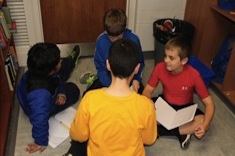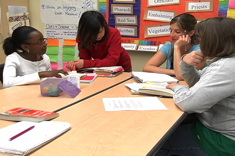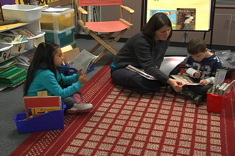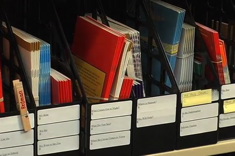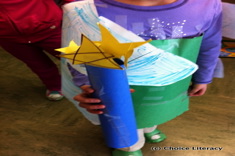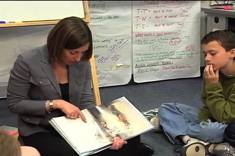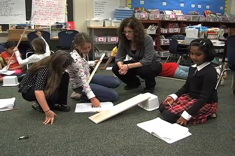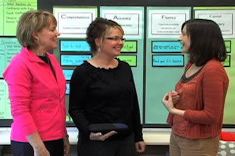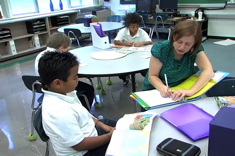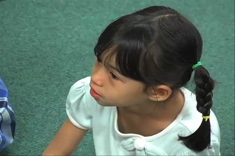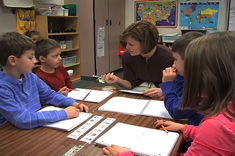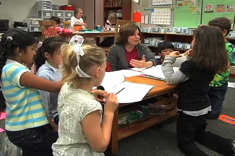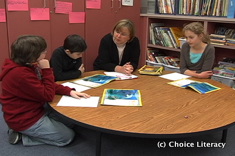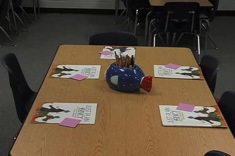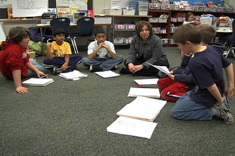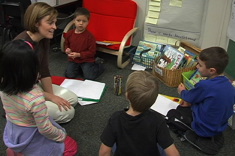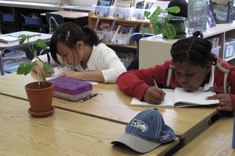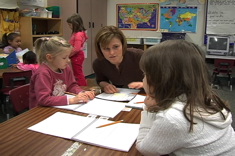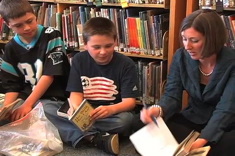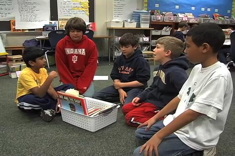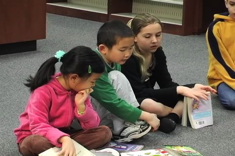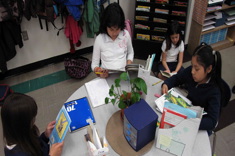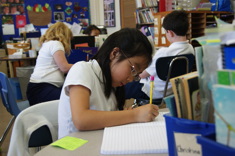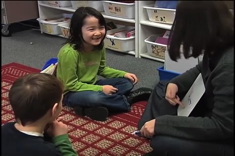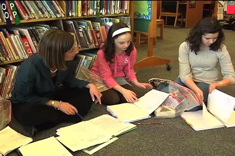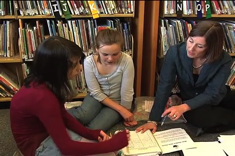Guiding Groups
How many? How often? How to assess? What's the teacher's role? We share flexible and creating strategies for leading groups, and teaching students how to partner and work well with classmates independently. Resources include everything from planning and assessment forms to scores of video examples of groups in action at many grade levels.
Latest Content
Grouping: Who? How Big? How Often?
In this first installment of a series on grouping, Heather Rader considers size, composition, and frequency.
How Do We Structure Small Groups? (Part 3 of the Grouping Series)
Heather Rader synthesizes recommendations and provides examples of how grouping structures work in classrooms.
How Do We Know Small-Group Instruction is Effective?
Heather Rader considers how to assess the effectiveness of groups.
Sorting Students for Flexible Groups Across Classrooms
Jennifer Jones explains how one team of second-grade teachers formed guided reading groups across classrooms to marshal resources and expand their collaboration.
Ready for Guided Reading? A Second Look
Shari Frost updates her original essay on guided reading with her latest thinking and criteria for placing students in guided reading groups.
One Book/Four Hands: Mentoring Younger Readers Using Picture Books
Paul Hankins describes the power of pairing high school and elementary students in a partner reading program.
Readers’ Theater Revisited
Katie DiCesare becomes reacquainted with an old curricular friend. But in trying reader’s theater again in her primary classroom, she finds ways to streamline the process and foster more independence in students.
Planning Small Groups to Teach Phonetic Skills
The gap between a child learning a phonetic rule and actually being able to apply it is one that often vexes teachers. Clare Landrigan and Tammy Mulligan find systematic planning and routines for focused small-group work help many of their colleagues succeed in their phonics instruction.
Science Writing: Small Groups
In this second video in a three-part series, Jennifer Morgan leads her grades 3 and 4 students as they work together in small groups on a science and writing task.
When to Group?
Reading groups are such an ingrained element of our teaching culture that teachers can feel guilty if they choose other instructional methods. In this conversation with fourth-grade teacher Rachel, Joan Moser and Gail Boushey (“The Sisters”) talk about when it makes sense to group students.
Book Clubs: Setting the Stage with Conferring
We want students to discuss books in thoughtful, sophisticated ways in book clubs, but those skills don’t always come naturally. (Wait – do those skills ever come naturally?) Beth Lawson explains how she confers with individual children in her third-grade classroom to prepare them for independent book clubs with peers.
Guiding Readers in Kindergarten: A Planning and Assessment Template
If you’re considering guided reading groups in your kindergarten classroom, you’ll want to read Mandy Robek’s advice for getting started and keeping track with a simple planning and assessment form.
First Grade Guided Writing Group: Targeting Common Spelling Needs
In this video of a 1st grade guided writing group, Katie DiCesare works with children to address common issues with spelling and conventions. By grouping the students together, she is able to use her time well in addressing common needs among students.
When Does Level Matter? Being Efficient with Small Group Instruction
When does level matter in grouping students for reading instruction?  Franki Sibberson shares her latest thinking and a template to use in organizing groups.
The Importance of Book Clubs for Learners of Any Age
Karen Terlecky brings lessons from her adult book club to her structure of book clubs in her 5th grade classroom. The article includes launching and management tips.
Ready for Guided Reading?
Shari Frost writes about the “Level A Purgatory” many kindergartners and young students endure when teachers assign reading groups too early. Her feature includes other instructional options beyond small groups for early in the year that may be more appropriate for our youngest learners.
Knitting, Independence, and Small Group Routines for Intermediate Readers
Franki Sibberson uses a knitting analogy to reflect upon alternatives to guided reading in the intermediate grades that promote more student independence.
Overcoming Tears and Fears: Developing Criteria for Flexible Groups
Katie DiCesare comforts a student in tears at the end of the day, and realizes part of the problem may be that she moved the child into a guided writing group too quickly.
Rethinking Writing Centers – Winter Follow-Up
Shari Frost questioned the amount of writing going on in many elementary writing centers. She decided to work with a team of literacy coaches and teachers to explore ways to increase writing in classrooms – through better use of centers, or alternative programs. In this follow-up article, Shari presents two different solutions that are working well – one involves introducing writing tools in a more systematic way in centers, and the other is an implementation of a different program entirely for independent work.
Assessing Spelling in Writing Workshop Part 3: Embedding Instruction
In the last installment of this three-part series, Katie DiCesare shows how she translates the findings from individual students into instructional plans when she uses a spelling assessment in her 1st grade classroom.
Staying Focused in Literacy Workshops
Clare Landrigan meets with a group of fifth graders to talk about what’s going well in literacy workshops, and to set individual goals.
Making Predictions and Finding Evidence in Text
In this video from a fifth-grade small group, Clare Landrigan talks with students about making predictions and finding evidence in text.
“If You Like Matt Christopher” Student Book Share
In this video from Franki Sibberson’s grades 3-4 classroom, boys share books that are similar to ones written by Matt Christopher.
Open Book Clubs
Shari Frost shares the nuts and bolts of setting up open book clubs in your school. These clubs are a great way to expand the reading community, as well as connect school libraries and classrooms.
What Are Reading Centers?
Kathy Collins gives a detailed definition of how reading centers are connected to the goals of different reading units of study.
Rethinking Writing Centers
Shari Frost finds writing centers are beloved by many teachers and students. There’s only one problem – very little writing appears to be going on in the centers.
First Grade Small Group: Chunking
In this small group from Courtney Tomfohr's first-grade classroom, students work on their "chunking" skills.
Small Group After Demonstration Lesson
In this small group after a demonstration lesson in a 5th grade classroom, Clare Landrigan talks through strategies for inferring the meaning of new words while reading.
Running and Reading Logs
In this first video in a two-part series, Clare Landrigan meets with a group of fourth graders to talk about reading logs and goals. In this excerpt, Clare uses the analogy of how runners use logs to chart progress and set goals.
Running and Reading Logs Part II
In this second video in a two-part series, Clare Landrigan meets with a group of 4th graders to talk about reading logs and goals. In this excerpt, Clare confers with students over their logs and debriefs with their teacher.
Browse Content By
Type
Category
- Assessment Tools
- Big Fresh Archives
- Booklists
- Choice Numeracy
- Classroom Design
- Common Core
- Community Building
- Conferring
- Content Literacy
- Digital Literacy
- English Language Learners
- Equity
- Family Relations
- Free Samples
- Guiding Groups
- Leadership
- Literacy Coaches
- Mentor Texts
- Minilessons
- New Teacher Mentors
- Podcasts
- Poetry
- Quote Collections
- Reading Strategies
- Self Care
- Struggling and Striving Learners
- Talking and Listening
- Teacher Study Groups
- Teaching Reading
- Teaching Writing
- Word Study and Vocabulary
Author
- Melissa Quimby
- Nawal Qarooni
- Gwen Blumberg
- Julie Cox
- The Lead Learners
- Hannah Tills
- Josie Stewart
- Ruth Metcalfe
- Mallory Messenger
- Becca Burk
- Jodie Bailey
- Vivian Chen
- Mary Brower
- Tiffany Abbott Fuller
- Stephanie Affinito
- Ruth Ayres
- Leigh Anne Eck
- Heather Fisher
- Shari Frost
- Julie Johnson
- Suzy Kaback
- Gigi McAllister
- Shirl McPhillips
- Melanie Meehan
- Cathy Mere
- Debbie Miller
- Tara Barnett and Kate Mills
- Tammy Mulligan
- Dana Murphy
- Bitsy Parks
- David Pittman
- Brenda Power
- Heather Rader
- Matt Renwick
- Mandy Robek
- Christy Rush-Levine
- Gretchen Schroeder
- Jen Schwanke
- Brian Sepe
- Katherine Sokolowski
- Stella Villalba
- Jennifer Vincent
Grade Level
Choice Literacy Membership
Articles
Get full access to all Choice Literacy article content
Videos
Get full access to all Choice Literacy video content
Courses
Access Choice Literacy course curriculum and training

